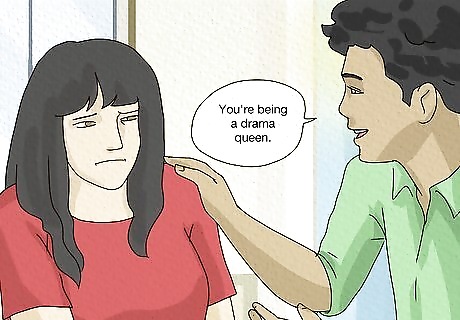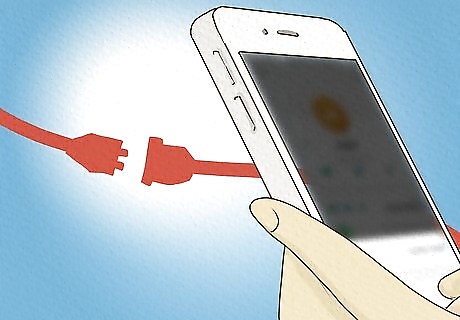
views
- Someone gaslights you if they lie to make you second-guess yourself and your feelings. It's a form of psychological manipulation and emotional abuse.
- Gaslighting disrupts your reality and makes you believe that you're the cause of the gaslighter's bad behavior.
- Recover from gaslighting by putting distance between you and the gaslighter and reconnecting with trusted friends and family.
Lying

They continue to deny something even when confronted with proof. Gaslighting goes beyond simple lying. A gaslighter doubles or even triples down on their lies, insisting on their reality, even if you show them cold, hard evidence that they're lying. They'll refuse your information and might attack you as well. They might say: "Your evidence is fake," "That other person is lying to you," "If you trusted me, you'd believe me." How to respond: Let them know that the lie bothers you more than the thing they're lying about. Encourage them to admit the reason they're clinging to this false story. For example, you might say, "I understand you might be embarrassed by the truth, but I'm not going to judge you."
Trivializing

They belittle or invalidate your feelings. In the gaslighter's mind, you have no good reason to think or feel the way you do. Your feelings are irrelevant to them, so they're going to try to manipulate you into believing that you don't have a right to feel the way you do. They might say: "You're overreacting," "You're too sensitive," "You're being a drama queen." How to respond: Take a moment alone to calm yourself down if you need to. Remind yourself that your feelings are valid and you have a right to feel the way you do. Talking to a trusted friend or family member can help validate your feelings as well.
Manipulating Reality

They change the narrative to make your feelings seem inappropriate. A gaslighter presents an alternate chain of events that makes them look innocent while you look like someone who's overreacting. In their world, they did nothing wrong and you're the one with the problem. This frequently blends with lying, since they're presenting you with a false narrative of what happened. They might say: "That's not how it happened," "You have a bad memory," "You're crazy." How to respond: Understand that they likely truly believe what they're saying—this is their perspective on what happened, even if it's factually incorrect. You might say, "I can understand how you'd feel that way." Remain calm and avoid insisting on your version of events or arguing any further. It isn't worth your emotional energy, and it's not your responsibility to have to convince them.
Scapegoating

They blame someone else rather than being accountable. Nothing is ever a gaslighter's fault. There's always some external reason that they behaved the way they did. If you're in a close relationship with the gaslighter, they'll frequently blame their actions on you. They might also blame your friends or family members as a way of turning you against them. They might say: "If you wouldn't do that, I wouldn't act this way," "It was her fault the project failed," "It's your friends' fault our relationship is a mess." How to respond: Typically, a gaslighter blames someone else because they don't want to admit that they're likely at fault. Let them know that you're willing to move past it if they'll acknowledge the role they played.
Coercing

They undermine your self-esteem so they can control you. With a gaslighter, it seems like you're never right about anything. After a while, it really does a number on your self-confidence—you just don't trust your own feelings and you second-guess everything you think. This can make you crave their approval (you just want to be right about something), which makes it easy for them to coerce you into doing things you wouldn't normally do. This sometimes blends with scapegoating, in that they'll blame their bad behavior on you, then claim you can end that bad behavior by doing something they want you to do. They might say: "I wouldn't flirt with other people if you dressed sexier," "If you really loved me you'd go out tonight," "This wouldn't happen if you took better care of yourself." How to respond: If any relationship has gotten to the point that the gaslighter is attempting to coerce you into doing things you don't want to do, it's time to leave for your own wellbeing. Make a plan and reach out to someone you trust to help you.
Recovering from Gaslighting

Talk to your trusted friends and family members. Friends and family members can validate your feelings and reinforce your reality. They help restore your confidence by assuring you that you're not in the wrong. Their outside perspective can help you recognize gaslighting for what it is so you won't be manipulated by it in the future. This is especially important if your gaslighter has been trying to isolate you from friends and family, who would provide a different perspective on your relationship. Isolation is a huge part of gaslighting. Just one person validating your feelings and perspective and telling you that you're not crazy can make a huge difference.

Focus on your own self-care. Now is the time to be really good to yourself—especially if you were sacrificing your needs for the gaslighter. Even if you think you don't deserve to be loved and cared for, do it anyway! It'll take a little time, but gradually you'll start to feel a lot better. Start by trying to get better sleep. Stress can wreak havoc on your sleep patterns. When you're well-rested, you'll feel a lot better about yourself and have more energy.

Write the person gaslighting you a letter. When you write a letter, you can remain calm and in control of your emotions. The other person can't interrupt you or attempt to change your story. This gives you an opportunity to tell the person exactly what you want to tell them. It also creates a record of what you said, which makes it more difficult for them to gaslight you about the situation later. Frequently, overwhelming emotions cause people to unintentionally resort to gaslighting. Because you're not face-to-face, they have time to calmly read and respond to your letter and handle the situation more productively.

Block contact with the gaslighter as much as possible. As long as you're still talking to the gaslighter, they still have some measure of control over you and your feelings. Prioritize your recovery by cutting them out of your life. Block them on social media and block their email and phone number so they can't get in contact with you and try to pull you back in. Tell mutual friends that you're doing this and that you don't want to hear from or about the gaslighter. You don't have to go into detail if you don't feel comfortable doing so—just say they're no longer in your life. If you and the gaslighter have children together, or still work together, limit your interactions to whatever's necessary and don't talk to them about anything else. They'll likely try to bring up other things or relate to you personally—just ignore it.

Seek professional help. If you find that you're frequently doubting yourself or your feelings, a therapist can help you regain your self-confidence. Don't be embarrassed or ashamed to reach out to a professional—they can help you get your life back! Search in your local area for a therapist who has experience dealing with victims of gaslighting. When you go to a therapist, be ready to do the work. Bring an open heart and an open mind and they'll help you regain control over your thoughts and feelings.



















Comments
0 comment